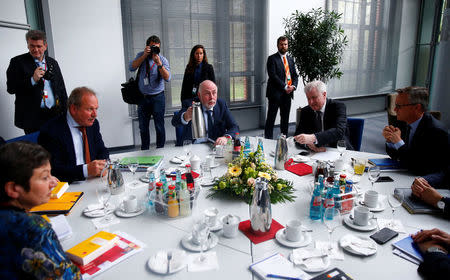German unions, employers agree pay hike for public sector workers

By Thorsten Severin
POTSDAM, Germany (Reuters) - German unions and employers ended marathon pay talks early on Wednesday with a phased agreement to boost the pay of more 2 million public sector workers by some 7.5 percent over two-and-a-half years.
The agreement gives workers a 3.19 percent raise backdated to March 1, followed by a 3.09 percent increase from April 1, 2019, and a further 1.06 percent from March 1, 2020, negotiators told reporters just after 1 a.m. (2300 GMT).
It also provides one-off payments of 250 euros ($309) to lower-paid workers and reworks pay scales to make them more transparent.
German Interior Minister Horst Seehofer, who led the negotiations for employers for the first time, said the deal would cost the federal government some 2.2 billion euros ($2.7 billion) per year, while making public service a more attractive option.
Communities would pay another 7.5 billion euros extra each year, the lead negotiator for the VKA Association of Local Government Employers said.
"I'm satisfied. The public finances will not be overstretched," Seehofer told reporters. He said the negotiations were intense, but he had the benefit of participating in two rounds of coalition negotiations after last September's elections.
The Verdi trade union and the dbb association of civil servants had sought a pay rise of 6 percent for one year, or at least 200 euros more a month, but said they were pleased with the agreement that emerged.
"It is the best result in many years," Verdi chief Frank Bsirske told reporters in the town of Potsdam near Berlin.
Negotiators for the unions and employers struck the deal late Tuesday during a third round of talks that began on Sunday, after walkouts by more than 150,000 union members last week.
It took several more hours for the unions' authorising committees and members of the VKA Association of Local Government Employers to approve the deal.
The deal covers about 2.3 million public sector workers, but the interior ministry said it will introduce a law to extend it to civil servants, judges and soldiers.
Employers had balked at the unions' initial pay rise demand, but said they agreed that public sector workers should benefit from strong growth in Europe's largest economy.
Buoyant tax revenues, a record budget surplus, falling unemployment and low borrowing costs have fuelled a consumer upswing in Germany.
In the industrial sector, 3.9 million workers agreed on a pay and flexible working hours deal in February that amounted to a roughly 4 percent annual rise for 2018 and 2019. Inflation edged up to 1.5 percent in March.
The European Central Bank is keeping a close eye on German wage negotiations for any sign that wage growth is picking up, potentially lifting inflation and giving the ECB added leeway to start winding down its massive stimulus programme.
Last week, hundreds of flights were cancelled as tens of thousands of ground staff and other public sector workers staged walkouts, which also hit nurseries and rubbish collection in German cities. [nL8N1RN2DR]
($1 = 0.8083 euros)
(Reporting by Thorsten Severin; Writing by Madeline Chambers and Andrea Shalal; Editing by Gareth Jones, William Maclean and Lisa Shumaker)

